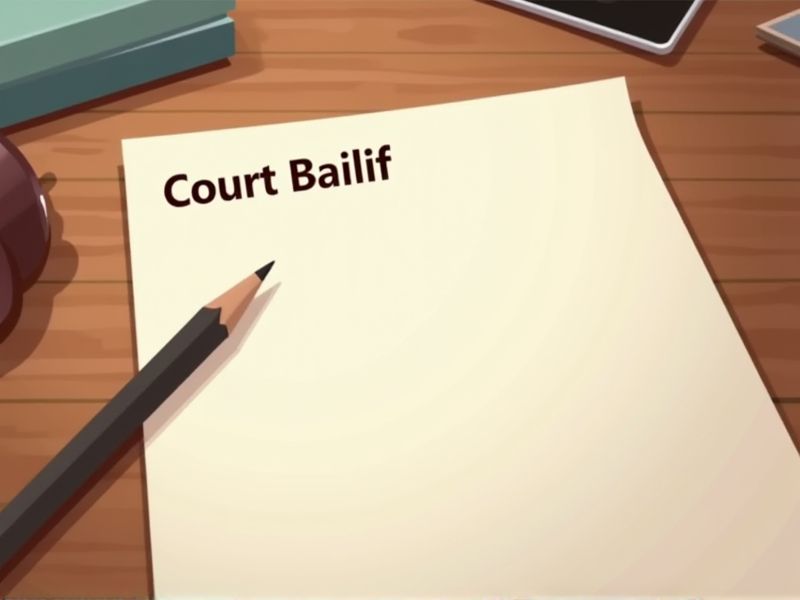
Court Bailiffs play a crucial role in maintaining courtroom decorum, enforcing orders, and managing legal documents. Certifications ensure they possess the requisite knowledge and skills for these responsibilities, such as understanding legal procedures and ensuring safety protocols. Certification courses often cover essential topics like conflict resolution and legal terminology proficiency. Some important certifications you may need for a Court Bailiff include those focusing on legal, law enforcement, and conflict management skills.
Court Bailiff Certification Program
Court bailiffs need certification programs to ensure they have the necessary skills and knowledge to maintain order and uphold legal procedures effectively. Certification establishes a standardized level of competency, reducing variability in performance and enhancing the overall efficiency of court operations. Proper training reduces potential liabilities and enhances safety within the courtroom by preparing bailiffs for situations they might encounter. Moreover, certification programs can improve public trust and confidence in the legal system by demonstrating a commitment to professional development and accountability.
Certified Law Enforcement Officer Certification
Certified Law Enforcement Officer Certification ensures a court bailiff is trained in law enforcement procedures, enhancing courtroom security. Certification requires knowledge of conflict resolution, which is critical for maintaining order during court proceedings. The certification process includes legal education pertinent to the role, ensuring bailiffs understand legal protocols and rights. Certified bailiffs are often required to handle emergencies, and certification equips them with the necessary skills for quick, effective responses.
Use of Force Training Certification
Court bailiffs often encounter situations that require the management of confrontational or potentially dangerous individuals, making use of force training essential for their safety and that of the courtroom. Certification ensures they possess the necessary skills to de-escalate situations appropriately, minimizing the risk of harm to the public and themselves. Courts rely on bailiffs to be credible witnesses in cases where force was applied, and certification provides the legal backing for their actions. Training in use of force helps maintain the integrity of the legal process by ensuring all courtroom interactions adhere to established legal standards.
Defensive Tactics Certification
Court bailiffs often face volatile situations requiring physical intervention due to their role in maintaining courtroom order. Defensive tactics certification equips them with essential skills to handle disturbances safely. Without such training, bailiffs might resort to inappropriate force, increasing liability risks. Certification ensures bailiffs can protect themselves and others efficiently, enhancing overall court security.
Crisis Intervention Training (CIT) Certification
Crisis Intervention Training (CIT) Certification equips court bailiffs with essential skills to de-escalate potentially volatile situations, reducing the likelihood of violence. This certification also enhances the bailiffs' ability to recognize and manage individuals with mental health issues, ensuring appropriate and compassionate responses. The training supports the legal system's goal of maintaining safety and order within courtroom settings, thus protecting all parties involved. Increased proficiency in crisis management leads to improved public perception and trust in the judicial system's handling of sensitive cases.
Emergency First Aid and CPR Certification
Court bailiffs often manage situations where immediate medical attention might be required, making Emergency First Aid and CPR Certification essential. Their role in maintaining courtroom order means they are often first responders to health emergencies. A bailiff trained in CPR can increase the chances of survival for someone experiencing cardiac arrest until professional medical personnel arrive. Certification ensures they handle medical situations with appropriate skill, reducing risks and enhancing safety in the courtroom environment.
Firearms Proficiency Certification
Firearms proficiency certification for court bailiffs ensures they have the necessary skills to safely and effectively respond to potential threats in a courtroom setting. Improved firearm handling reduces the risk of accidental discharge, enhancing the safety of all individuals present in the court. Proficient bailiffs instill greater confidence among court officials and the public, contributing to a more secure environment. Maintaining firearms certification means bailiffs stay updated on the latest best practices, aligning with legal and operational standards.
Court Security Management Certification
Court Security Management Certification equips court bailiffs with specialized knowledge in handling security threats, which enhances the safety of court environments. It provides comprehensive training in risk assessment, allowing bailiffs to preemptively address potential vulnerabilities in court operations. The certification also standardizes protocols for emergency response, ensuring that bailiffs are prepared to act efficiently during crises. Courts prioritize this certification to maintain public trust by demonstrating a committed approach to security and safety measures.
Effective Communication and Conflict Resolution Certification
Court bailiffs often interact with individuals in tense and stressful situations, making effective communication essential to de-escalate potential conflicts. Without proper conflict resolution skills, there is a risk of misunderstandings escalating into confrontations, compromising court security. Certification in these areas equips bailiffs with techniques to mediate disputes and maintain a calm courtroom environment. Implementing this certification can foster trust and cooperation among court personnel and the public, enhancing overall judicial efficiency.
Legal Procedures and Ethics Certification
Court bailiffs are responsible for maintaining order in the courtroom; certification ensures they understand legal procedures and can enforce them properly. A certification in legal procedures and ethics instills professional accountability, mitigating the risk of rights violations. Without adequate training, a bailiff might inadvertently disrupt legal proceedings, leading to mistrials or appeals. Certification helps guarantee trust in the judicial process by assuring the public that court officers act without bias or unethical conduct.
Summary
When you acquire certifications as a Court Bailiff, your job proficiency significantly increases due to the enhanced skills and knowledge gained. With these certifications, you can expect improved trust and credibility among peers and superiors. The certifications can lead to increased responsibilities and potential career advancement opportunities. Employers often recognize certified individuals as assets, which may result in better job security and potential salary increments.
